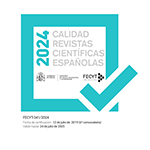In defense of an enlightened: Isabella Andreini and the Academy
Abstract
It is probable that no other time in History has brought misogyny to a higher level than that which manifested itself in the so called Tridentine culture. During this period, feminine taming would be a matter of central importance for both religious and lay authorities, so that any deviation from the desired feminine tasks (nun-daughter-wife-mother)—somehow considered “canonical”—could be severely punished. Undoubtedly, among the vilest professions that a decent woman could take was being an actress. It was considered so evil, so low, that in most cases women had to change their names to prevent social condemnation from reaching their own families. Unlike many other women of her time, Isabella Canali Andreini (Padua, 1562 - Lyon, 1604), was able to perform both on the stage and as a writer using her real name until her death. In the cultural context of the many Italian academies of the second half of the sixteenth century, Isabella could also build a true patronage network that would help her not only escape the persecutions of those times, but also to uphold her desire to leave her own legacy by means of writing.
The aim of this work will be, then, to try to reconstruct the route taken by Isabella in the construction of the aforementioned network, and to examine the results obtained by her work as an academic.
Downloads
Article download
License
In order to support the global exchange of knowledge, the journal Cuadernos de Filología Italiana is allowing unrestricted access to its content as from its publication in this electronic edition, and as such it is an open-access journal. The originals published in this journal are the property of the Complutense University of Madrid and any reproduction thereof in full or in part must cite the source. All content is distributed under a Creative Commons Attribution 4.0 use and distribution licence (CC BY 4.0). This circumstance must be expressly stated in these terms where necessary. You can view the summary and the complete legal text of the licence.










